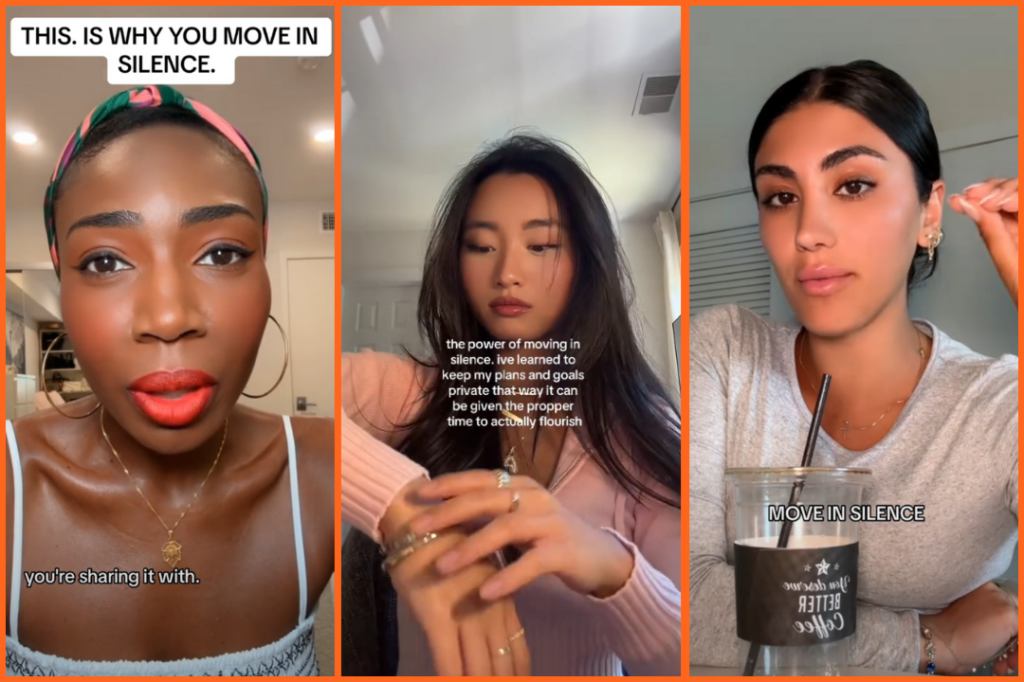TikTok’s latest viral wisdom is backed by hard data—and it’s making people rethink their communication habits. We live in a world of chronic oversharing. We post everything, from the routes we run (including screenshots as proof of all that hard work), to the pale-green iced matcha latte sitting at our desks or a present from a boyfriend (who will be tagged prominently, not secretly off screen). Who knows when, but our brains became wired for sharing: to record, to curate, and to post every second of our lives, then consume that of others to a disturbing degree. So, here’s a radical idea: when it comes to goals and plans, try keeping them to yourself. It could be the key to making them a reality.
That’s the message behind TikTok’s massively popular “Move in Silence” trend, where creators like @noemoneyyy have cracked the contradictory code to success: Instead of broadcasting every big idea or project that runs through your head, if you actually want it to come to fruition, keep your plans to yourself until they’re executed. And it’s not just a trend; surprisingly, science also supports this muted approach.
“As a former oversharer who used to tell every single friend, every single family member, or a partner everything I was doing, I promise you things always work out better when you keep them to yourself,” explains creator @noemoneyyy in a video that’s garnered millions of views.
On a different video by @mandanazarfhami, she says, “I don’t care what you’ve got going on in your life: that dream job, that city that you want to move to, that dream person, that dream life, that dream anything. Literally keep it to yourself until it’s done.”
Commentors were quick to agree, with one person writing: “From a young age, I never told anyone my next steps. I also taught my husband and son to keep our private matters to themselves and just do things Not many people like it, but who cares ”
Another chimed in, “This concept has changed my life for the better.” Others replied, “100 agree ” and “100% people can’t ruin what is silent, show results.”
What’s going on here
In a study done by New York University, researchers found that people who kept their goals private worked on tasks for an average of 45 minutes, compared to the 33 minutes of work completed by those who announced their plans in advance. The twist? The people who shared their goals expressed feeling closer to finishing, despite doing approximately 25% less work.
NYU psychologist Peter Gollwitzer, who led the research, concluded that “once you’ve told other people your intentions, it gives you a ‘premature sense of completeness.’” He also found that the brain is made up of “identity symbols,” which create one’s self-image. Interestingly, both action and talking about action create symbols in your brain, so simply speaking about a future plan or something you want to do satisfies that part of your brain. When we make our goals public, especially ones that matter to us and deal with our identity, our ability to achieve said goal is significantly reduced. As the old adage goes, “actions speak louder than words.”
Stranger still, in his paper “Does Social Reality Widen the Intention-Behavior Gap,” Gollwitzer notes that in order for this phenomenon to happen, one must truly care about their goals. “Ironically, this effect was only found for participants who are very committed to their goal!” PsychologyToday notes. “The lesson learned is that the more passionate you are about your goals, the more secretive you should be about them.”

Another reason to keep quiet: If you’re a beginner trying something new, sharing your plans could potentially open you up to criticism and negative feedback, which could deter you from even starting. At the University of Chicago, professor Ayelet Fishbach conducted studies to determine how positive and negative feedback affects the pursuit of one’s goal. According to Atlassian, she and her team found:
- When positive feedback signals commitment to a goal, it increases motivation.
- When positive feedback signals progress, it actually decreases motivation.
“One example the researchers give is a math student who gets a good grade on a test. If she perceives it to mean she likes math, she will study harder. If, however, she sees the high score as a sign she is making progress in the class, she may ease up and study less.” – Atlassian
We’ve all been there: excitedly telling everyone about your grand plans to backpack through Europe, the year you’ll finally learn Spanish, or joining the group lesson at the tennis courts you always pass by… only to mysteriously lose all motivation a week later. Turns out, those lovely dopamine bursts that accompany every enthusiastic “That sounds great!” or “You should totally do it!” response might be precisely what’s holding you back.
The good news? You don’t need to become closed-off and secretive, a hermit on the top of a mountain who’s afraid to share any part of themselves with the world. Research suggests that sharing your goals with one or two selected friends who can be trusted to provide meaningful support is still a good idea. Just hold off on the Instagram Live announcement until you’ve actually accomplished something substantial.
So, the next time you sit down to write your goals, whether they be a new year’s resolution, the day’s to-do list, or a five-year plan, think twice about sharing it with others. Give it time and you might have something better to share soon: the results.
This article originally appeared in April.








































